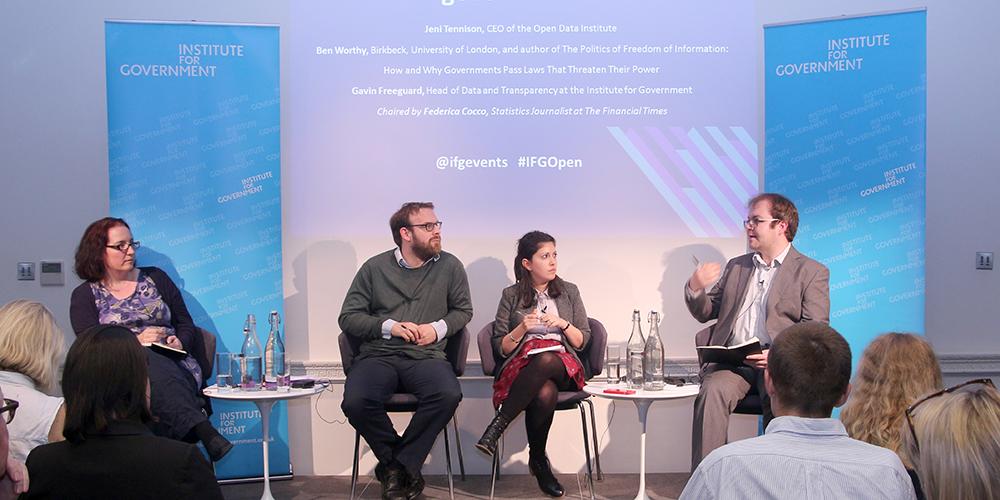Gavin Freeguard argues that, while there are some great examples of openness making government better, there are still barriers to overcome.
Is open government more effective government? This was the question posed to me, Jeni Tennison (CEO of the Open Data Institute) and Ben Worthy (lecturer at Birkbeck College and author of The Politics of Freedom of Information) by Financial Times journalist, Federica Cocco, and a very engaged audience at the IfG this week.
Broadly, the answer is yes – but government still isn’t seizing all the opportunities openness can provide.

Openness can drive effectiveness
We often take it to be self-evident that open government is a good thing, for:
- Accountability – Giving parliament, the press and the public tools to hold government to account.
- Effectiveness – Involving more people can bring greater insight (see Mastodon C’s identification of savings from prescription data), help develop policy and avoid ‘arrogance’ and ‘defective decision making’, and embed a strong culture of using data.
- Innovation – Opening things up can have economic and social benefits, e.g. transport apps like Citymapper.
Ben distinguished between the "exposure" or "fire alarm" effect of transparency (allowing people to expose problems, like MPs’ expenses) and the "anticipated reactions" effect (where the existence of transparency laws makes people behave better).
Jeni expanded open government to also include:
- Participation with communities (like the Open Government Partnership) allowing dialogue between civil society and government
- Delivery, setting standards and providing incentives (such as OpenActive which tries to get people playing sport)
- International influence, with openness as a soft power tool (e.g. the British Standards Institute)
- Open culture, where everyone contributes (such as Permanent Secretary Clare Moriarty’s ‘boldness’ at Defra).
If all of this is so self-evident and logical, why are we even asking whether open government is more effective?
Obstacles remain
President Trump, rolling back open government in the US. Reflections that greater transparency may have fuelled distrust in government. Brexit knocking open government (and everything else) down the political agenda, and stretching resources further when civil service staff numbers and departmental budgets are down. Theresa May’s direction on transparency not being entirely clear. These political events explain why many are asking this question now.
It can be difficult to find evidence to support some of the benefits of open government – how can you prove the systematic effects transparency has on a working culture, and how can you measure its value?
Political decision-makers, from Tony Blair to David Cameron have alleged "chilling effects" of transparency on government decision making. Cameron hoped the release of more data would create "an army of armchair auditors", but the public have deserted. Ben said politicians imagine transparency policies have a large constituency, but this is "pretty largely a myth".
Federica thought that the lack of willingness – of journalists, citizens and others – to experiment with data was a problem; some journalistic colleagues found the need for number-crunching “a bit scary”. Problems remain with the quality and usability of some government data.
Political risk is also a factor. As Jeni noted, a bold, open culture which includes an openness to critique and admit failure can be “extremely difficult to have within government”.
Opportunities can be seized
Open government can help politicians achieve their political objectives; secrecy and closed government may actually be the riskier option. This is the case even in fields associated with secrecy, like negotiations – as work from the Institute to be published next week will show, transparency can help strengthen your negotiating position, avoid bad decisions and bring people with you.
Martin O’Malley, the data-driven former Mayor of Baltimore and Governor of Maryland, wanted to know what was going on in the public services he wanted to reform. Making this information public meant people could see the lines on the chart sometimes heading in the wrong direction, which takes political courage.
It also helped build credibility around his political goals. And, as Institute polling has shown, more than two-thirds of people say they would be more likely to vote for parties that are open about how they’d implement their promises.
More evidence along these lines can show that open government is not just about accountability, but effectiveness; not just about principles, but pragmatism; and not just about obligations, but opportunities.